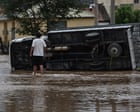
In recent weeks, diverse environmental phenomena have unfolded across the globe, illustrating both the power of nature and the resilience of communities. From severe floods in China to transformative heatwaves in the Nordic countries, these events highlight the challenges and adaptability required in the face of changing climates.
In northern China, torrential rains have led to devastating floods, particularly affecting Beijing and its surrounding regions. Over the course of six days, between July 23 and July 29, the area endured rainfall amounts that typically span an entire month, with the suburban district of Miyun receiving an astonishing 543mm of rain, matching its annual average. The impact has been severe; approximately 70 lives have been lost, including 31 individuals in a care home, with additional fatalities resulting from landslides and road accidents. Despite these challenges, efforts are ongoing to aid those affected and to repair the damage inflicted by these intense weather conditions.
On the opposite end of the temperature spectrum, Nordic countries are experiencing a heatwave of unprecedented intensity. Regions within the Arctic Circle in Norway have seen temperatures soar above 30°C for 13 consecutive days in July, a new record since such measurements began in 1961. Similarly, Finland has been in the grip of a persistent heat pattern, with several weeks registering consistent 30°C readings. This extraordinary weather underscores the broader impact of climate change, and communities are adapting to cope with the rising temperatures.
The challenging weather conditions extend beyond China and Northern Europe, reaching places like the Hunter region of New South Wales, Australia, where heavy rainfall has resulted in emergencies. A young woman was swept away by floodwaters as more than 1,450 related incidents called for urgent attention from emergency services. Search efforts continue, with local authorities on high alert as the rain persists and poses further risks to the community.
Moreover, in Portugal, the enduring issue of wildfires re-emerges, with authorities declaring a state of alert in response to increasing fire risks in several regions. As a proactive measure, the Portuguese government has opted to address these concerns without invoking the European Mechanism for Civil Protection, relying instead on national resources and strategies to manage the situation. This decision has been positively received by the President, emphasizing the readiness and self-reliance of national efforts.
Meanwhile, a seismic event in the Azores, specifically a 5.3 magnitude earthquake felt near São Miguel, further emphasizes the dynamic natural forces at play. The island’s residents are familiar with such activities and have shown resilience through established safety protocols and preparedness measures.
These simultaneous weather events from around the globe serve as a tapestry of human resilience and adaptability. Communities continue to face and overcome environmental challenges, learning and evolving their strategies to protect lives and livelihoods. While the damage from such natural occurrences can be profound, they also offer opportunities for innovation in climate adaptation and response strategies, creating a future where communities are better equipped to withstand nature’s changing extremes.
Source: {link}
